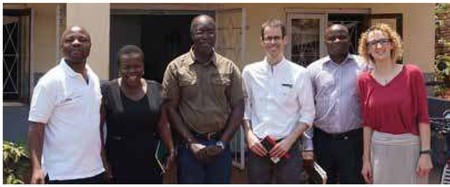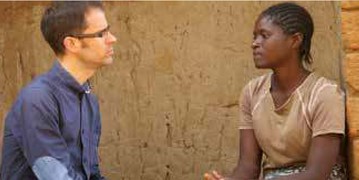The Head of Oxfam Scotland Jamie Livingstone offers a first hand account of the ongoing food crisis in Malawi.
GROWING up with ‘Livingstone’ as a surname, I was aware from an early age of the impact and legacy of the Scottish missionary and explorer David Livingstone, particularly in Malawi. During my recent visit to the country, I heard for myself the huge esteem in which he is still held nearly 150 years since his death.
Since then, the links between Malawi and Scotland have multiplied hugely with over a thousand connections between churches, schools and communities in the two countries. The Scottish Government’s partnership agreement with the Government of Malawi is now more than a decade old.
Critically, it’s a relationship built on mutual respect and learning but, right now, the people of Malawi need Scotland’s support more than ever.
Southern Africa’s worst drought in 35 years has left 6.5 million people in Malawi hungry – more than the entire population of Scotland. Maize crops, an essential source of food in a country in which nine out of every 10 people rely on rain-fed farming, have been devastated by the drought. Last April, the Government of Malawi declared a state of emergency.
Oxfam launched an emergency appeal last July to raise the funds we need to respond to the crisis. Similar appeals have been launched by Christian Aid Scotland, the Scottish Catholic International Aid Fund and EMMS International.

Jamie Livingstone and Lisa Stewart of Oxfam Scotland in Malawi
During my visit, I saw for myself the terrible situation Malawians are enduring. I met 24-year-old Jenipher Nkotima from Nkanda village in Mulanje district who looks after her three young nephews, as she has done since her sister’s death. She epitomises the daily battle against hunger. Looking into her eyes, it was impossible to miss her deep desperation and her fears for the future. Jenipher’s maize crop failed and, while she can sometimes scrape one meal together, on other days she eats nothing at all. “Last year the harvest was very low”, she told me. “I had four bags of maize and we ate them within three months. I have no food.”
The rains are expected soon but Jenipher urgently needs seeds and fertilisers to start growing again. Yet no-one knows if there will be too much rain or too little, and crops planted soon will take months to grow.
“We do not want to rely on food aid”, said Jenipher. But she added: “It would be disastrous if there is no help. I may lose one of the orphans due to lack of food”.

Jamie Livingstone meets Jenipher Nkotima
Oxfam’s emergency response in Malawi has already reached more than 230,000 people, including Jennifer, and we aim to support a total of 650,000 across five districts by June 2017. Our immediate focus is on giving people not only food supplies but also cash to allow them to buy food imported to the worst-affect areas. Giving people money not only increases their level of choice and dignity but also stimulates the local economy. For many, including the 90-year-old woman I watched patiently queue for her allocation, the payments are a critical lifeline.
We are also helping communities to break the cycle of crisis in Malawi through longer term projects which seek to build resilience. This is critical amid growing recognition that the number of floods and droughts is likely to increase due to climate change. We’re helping farmers protect their livelihoods by giving them drought-resilient seeds, fertilisers and training, to help prevent this crisis stretching into another year.
However, Oxfam’s work is only 60% funded – limiting the breadth and depth of our reach and leaving far too many people completely unsupported. Our emergency appeal hopes to plug some of that gap. The country known as the “warm heart of Africa” needs help from Scotland’s warm-hearted and generous people now more than ever.
Oxfam’s Malawi Food Crisis appeal:
www.oxfam.org.uk/what-we-do/emergency-response/malawi-food-crisis